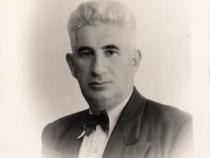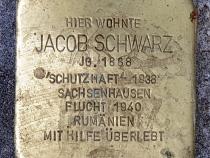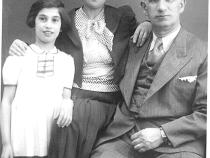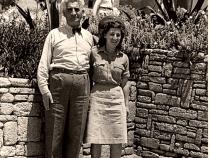Jacob Schwarz was born on 21 April 1888 in Oświęcim in Poland, the town that later became sadly famous for the construction of the Auschwitz concentration camp. He was the fourth of six children of Avraham Horn and Miriam Schwarz.
As a young man, Jacob moved to Berlin, Germany, to build a better life for himself. There he met Mindel Neugewirtz and married her in 1920. Jacob and Mindel were both raised in an orthodox home and their three children - Allan, Shula and Paula - were raised in this tradition. Jacob was professionally active in various fields. He worked as a tailor, machinist and chocolatier and even spent some time in Paris, where he sold his confectionery.
When he returned to Berlin from Paris in 1936, he saw with his own eyes how the Nuremberg Laws passed in 1935 were depressing the lives of the Jewish community. To protect their children, Jacob and Mindel applied for immigration visas for them. Allan received a student visa for the United States in October 1938, and Shula travelled to Palestine in July 1939 as part of a youth aliyah. As their youngest daughter Paula, aged 8, was still too young to be sent away, Mindel and Jacob decided that she should stay with them in Germany.
Their hopes that their family could stay together were soon dashed when Jacob was arrested by the Gestapo on a pretext at the end of 1938 and taken to the Sachsenhausen concentration camp near Berlin. Sachsenhausen was a notorious place where thousands died from disease, lack of food and exhaustion. Jacob's brother-in-law had died there the year before. In her desperation to save her husband from the same fate, Mindel learnt that a Swiss agency was able to "buy" Jacob out of Sachsenhausen and take him to Romania. With the help of her son Allan and other relatives in the United States, they managed to buy Jacob's release.
Jacob fled to Romania, where he boarded the ship Pentcho in Sulina in the hope of reaching freedom and Palestine. The voyage of the Pentcho represents a separate chapter in the dramatic flight of Jewish people from Europe. The ship was merely a river steamer that was to cross the Black Sea and the Mediterranean to its destination of Palestine. This almost suicidal endeavour was made even more difficult by the fact that hardly any of the countries whose territory the Pentcho touched during its journey were prepared to grant aid to the refugees on board. It therefore already seems like a great miracle that the paddlewheel-driven river steamer actually made it to the eastern Aegean near Rhodes. After the propulsion boiler exploded, the ship ran aground on an uninhabited island. All the passengers and crew managed to save themselves on land. Here they were finally picked up by the Italian navy and interned on the island of Rhodes. Jacob and the other refugees from the Pentcho remained there for over a year in a hastily constructed camp. In January 1942, the prisoners of war were transferred to the Ferramonti internment camp in southern Italy, where they remained until Italy was captured by the Allies.
After his release from Ferramonti, Jacob's journey continued to Cyprus. There he boarded a ship to Palestine, which had to evade the British blockade. Jacob finally arrived in Palestine in 1946, where he was reunited with his daughter Shula, who was serving as a nurse in the British army. Jacob's wife Mindel and their daughter Paula had been murdered in Auschwitz in 1943. Jacob's journey from Berlin to Palestine had taken six years.
Three years later, in 1949, he emigrated to the United States, where he reunited with his son Allan in New York, 11 years after his family had been torn apart. Jacob died in New York on 23 April 1957 at the age of 69.








